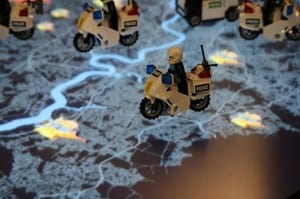Social Physics in the Big City
By Clare S Ryan, on 12 December 2012

CASA’s ENFOLDing group used real data from the
London riots and contagion modelling principles to
create a riot model that could be used to identify
areas of high risk and predict the outcome of
police response.
So what the heck is “social physics” anyway? That’s probably the question that most people who rocked up to Dr Martin Zaltz Austwick’s Lunch Hour Lecture, Social Physics in the Big City, were thinking to themselves.
No offence, but physicists aren’t exactly famed for their social brilliance (as Martin is quick to point out). However, having met Martin before, I was slightly more optimistic.
It turns out that Martin (who describes himself as a social physicist FYI) has some fairly hefty academic forefathers including 19th century French philosopher Auguste Comte (sadly not related to the delicious French cheese) and his contemporary, the mathematician and sociologist Adolphe Quatelet.
These two had the idea of using maths to predict the future of society – an aim they had in common with later thinkers such as Karl Marx (big ideas, less successful when it came to undermining capitalism in the long run) and Isaac Asimov (great science fiction author, less great academic).
 Close
Close


